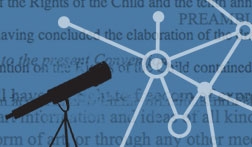Tracking the developments behind the political and courtroom dramas.
Politicians, judges and lawyers are debating children’s rights every day in countries all around the world. International courts, tribunals and bodies also add to this important legal debate that shapes what children’s rights mean in reality. So we monitor developments in children’s rights law across countries and international bodies, and conduct legal research in specific areas, particularly once we spot a trend.
Since we believe in openness and sharing of information and tools, we are producing guides on how to do legal research for every country in the world as part of our “access to justice for children” project.
Tracking law reform
We are very interested in any law reform that concerns children’s rights. We track the process carefully, particularly in the below areas:
Inhuman sentencing of children
Children can lawfully be sentenced to death in 14 countries by lethal injection, hanging, shooting or stoning. In some countries children as young as seven are sentenced to life imprisonment. And in at least 40 States, ‘justice’ systems allow for corporal punishment of children including whipping, flogging, caning or amputation.
As part of our campaign to end the inhuman sentencing of children, CRIN conducts detailed legal research into the States that continue to hand out these barbaric sentences or worryingly keep them on their statute books.
More States criminalising more children
Criminalising children does not work – in fact, it just makes things worse for the child, their family and society. Punishment of children has no place in juvenile justice. We need to find another way of working with children in conflict with the law – one that respects human rights and focuses on the best interests of the child, while having regard for public safety and security.
Yet CRIN has collected worrying evidence that a growing number of States in all regions, far from fulfilling their obligations to respect the rights of all children, are moving backwards in their approach to juvenile justice and criminalising more children - at even younger ages. The minimum age of criminal responsibility in some countries is as low as seven or eight; other countries don’t even have a minimum age. For more information, see this list of States that have lowered or are proposing to lower the age at which they criminalise children.
Children’s rights case law database
Within our legal database of cases that focus on children’s rights issues, our CRC in Court database contains our tracking of court cases around the world in which the Convention on the Rights of the Child (CRC) has been used. We then publish plain language summaries and analysis of what each case means for children’s rights.
We also track and analyse cases that concern children’s rights before UN treaty bodies (such as the Committee against Torture, Committee on the Elimination of Discrimination Against Women, and many more). To help us place children’s rights into the broader human rights discourse, we also look at discussions and reports that feature children’s rights across the UN - from the General Assembly to findings from independent human rights experts. (See our UN guide for more on the UN and how it works.)
CRC in Court: CRIN’s report on case law involving the CRC around the world
Inside and outside the courtroom, the CRC has proved to be a uniquely powerful tool for advancing children’s rights. This report looks at how the CRC has been used in courts around the world, analysing case law researched between 2009 and 2012. Exploring the potential for advancing children’s rights through legal advocacy, we hope that by reviewing case law on the CRC we will inspire lawyers and children’s rights advocates to use the CRC in judicial proceedings.
Access to justice for children: challenging violations of children's rights
Children’s rights abuses are rife all over the world. The Convention on the Rights of the Child is not perfect, but it enshrines the children’s rights that every State Party ought to protect. So how can children and their advocates challenge rights violations?
To help we have launched an ambitious project to find out and report on "access to justice for children" for every country in the world.
Optional Protocol on the sale of children, child prostitution and child sexual abuse images - National Legal Reform Project
This project examines the implementation of the Optional Protocol on the sale of children, child prostitution and child pornography (OPSC) in national law around the globe. Looking at how the OPSC has influenced legal reform in individual countries across different regions, we hope to inspire advocates in these and other jurisdictions to promote national legislation and policies that better respect the rights of children under the OPSC. Through this, we also seek to encourage positive legal change in the ways that our justice systems address child victims of exploitation and violence in general.


